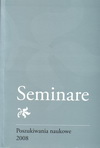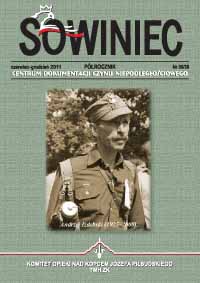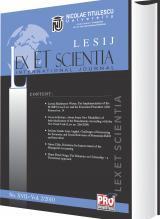


In this article the primary foundations of Reverend Don Bosko preventive system in Salesian Educational Centre in Rozanystok have been presented. The author described the history of the Centre and analized its functioning. The research were done by means of questionnaires and interviews. The analysis of the obtained empirical data made possible to draw the conclusions concerning the functioning of the Centre in three spheres: mind, religion and love. On the basis of the research justifiable is statement that in the Centre has been still developing by improving the methods and forms of working with youth on the basis of Don Bosko pedagogy.
More...
The practise of the Jesus Prayer „The Lord Jesus Christ, Son of David, have mercy on me”, though it reaches with origin far antiquity, however also today is alive and receive in Orthodox Church. We notice, also the interest from side of Catholic Church, so why is proper to acquaint with rich history shaping of the Prayer Jesus, and also with biblical premises and values of this prayer for man of day XXI age. Holy Writing is the first of all source the Prayer of Jesus, because already Old Testament shows how for Israelite the great meaning have God's Name, while New Testament shows method of prayer. The basis of Jesus Prayer is the fragment about blind beggar the Bartimaeus, which at gates of Jericho with creed scream: "Jesus, Son of David, have mercy on me" (Mac 10, 47). The fathers of desert and the monks of Egyptian, Syrians, Synais and especially fathers of Mountain the Athos took over these the call of Bartimaeus as theirs incessant prayer. From this time we know method Jesus prayer, which today interest not only Eastern Christianity how also and Western.
More...
Bieg wydarzeń dziejowych sprawił, że od końca XVIII w. Polacy musieli bronić swej niepodległości lub o nią walczyć. Walka ta przybierała różne formy: wojen, powstań, konspiracji, emigracji politycznej i wreszcie coraz częściej w XX stuleciu oporu społecznego. Mimo zmieniających się okoliczności zewnętrznych i przemian, jakim w ciągu dwu stuleci podlegało polskie społeczeństwo, można bez wątpienia dostrzec pewną ciągłość idei i postaw, trwałość funkcjonowania etosu niepodległościowego oraz powtarzalność form działania. Długotrwała egzystencja w takich warunkach, będąca dziedziczonym z pokolenia na pokolenie zbiorowym doświadczeniem, musiała wpłynąć na polską psychikę, zmuszając do wykształcenia specyficznych form walki o przetrwanie i obronę narodowych wartości przed opresją, miała nauczyć pozytywnego działania w warunkach stałego zagrożenia, wreszcie szukania alternatywnych form życia zbiorowego przy braku własnego suwerennego państwa.
More...
Trzydziesta rocznica strajków sierpniowych 1980 r. oraz powołania Niezależnego Związku Zawodowego „Solidarność” skłoniła Zarząd Fundacji CDCN do uruchomienia projektu badawczego mającego na celu odtworzenie struktury niezależnego związku w Krakowie i Małopolsce. Powodem tych działań jest brak podstawowych informacji dotyczących składu osobowego gremiów kierowniczych związku na poziomie Komisji Zakładowych. Szacunkowo określa się liczbę członków „Solidarności” w Małopolsce na blisko 600 tys. osób. Jednak stan wiedzy o ludziach działających w małopolskiej „Solidarności” ogranicza się jedynie do kilkusetosobowej grupy osób internowanych i więzionych w czasie stanu wojennego, pochodzących ze struktur regionalnych związku lub poszczególnych zakładów pracy. Brak podstawowych informacji na temat Komisji Zakładowych i ich składów personalnych. Kilka lat temu Fundacja CDCN w oparciu o przechowywane w swoim zasobie archiwum małopolskiej „Solidarności” zestawiła na swoim portalu www.sowiniec.com.pl wykaz Komisji Zakładowych NSZZ „Solidarność” Regionu Małopolska. Kolejnym krokiem jest gromadzenie szczegółowych informacji na temat konkretnych Komisji Zakładowych. W tym celu opracowano ankietę (dostępną również na wspomnianej stronie internetowej) całościowo obejmującą historię poszczególnych Komisji Zakładowych. Poniżej zamieszczamy odpowiedzi przygotowane przez Tadeusza Konika, działacza NSZZ „Solidarność” WSK PZL w Krakowie, szczegółowo oddające realia funkcjonowania niezależnego związku w dużym zakładzie pracy Małopolski1. Zachowano charakterystyczny język relacji, ingerencje w tekst ograniczyły się jedynie do niezbędnych korekt stylistycznych.
More...
Autor urodził się 4 listopada 1925 r. w Warszawie. Lata okupacji niemieckiej spędził w Pruszkowie, gdzie ukończył szkołę budowlaną. W okresie od kwietnia do sierpnia 1944 r. przeszedł szkolenie w Szkole Podchorążych NSZ w Pruszkowie. Następnie służył w AK, kończąc służbę 19 stycznia 1945 r. w stopniu starszego strzelca. Po zdaniu matury w sierpniu 1945 r. w Piastowie, w latach 1945-1950 był studentem Politechniki Gdańskiej, którą ukończył z tytułem magistra inżyniera budownictwa lądowego. W 1950 r. rozpoczął pracę w Przedsiębiorstwie Budownictwa Miejskiego w Krakowie-Nowej Hucie („nakaz pracy”). Następnie pracował w pracowni projektowej przy PBM jako projektant konstrukcji, a później w Zarządzie Produkcji Elementów Budowlanych jako główny inżynier Zarządu. Odszedł stamtąd w 1978 r. W latach 1978-1984 pracował w Spółdzielni „Gromada” jako Kierownik Pracowni Projektowej; w okresie 1984-1987 był zatrudniony w krakowskim „Iglopolu”, a bezpośrednio potem do roku 1989 w Biurze Projektów Przemysłu Paszowego. Od 1990 r. przebywał na emeryturze. Współpracownik KOR (1979-1981), następnie KPN (od września 1981 r.), w listopadzie 1984 r. sygnatariusz Inicjatywy Obywatelskiej „Przeciw Przemocy”, uczestnik Marszów Szlakiem I Kompanii Kadrowej, autor artykułów i kolporter prasy niezależnej, wielokrotnie zatrzymywany (w tym trzymiesięczna sankcja prokuratorska; 2 maja – 1 sierpnia 1986 r.), przewodniczący Obszaru II KPN w Krakowie (1988), uczestnik Międzynarodowej Konferencji Praw Człowieka w Krakowie-Mistrzejowicach (sierpień 1988), po roku 1990 nadal działał w KPN.
More...
Piękno Krakowa z jego zabytkami, stanowiącymi najstarszą część miasta, to nie tylko ciekawe historie, tradycja i obyczaje. To także opowieść barwnych legend, jak bluszcz oplatających sędziwe pomniki. Zwyczajowo to interesująca i dominująca strefa zwiedzania. Jednak jeszcze inne wartości poznawcze wiążą się z obrzeżami administracyjnymi miasta i przyległymi gminami. W kręgu zainteresowań są zwykle ludzie, którzy ongiś żyli i tworzyli cząstkę historii ziemi ojczystej oraz zabytki materialne.
More...
As a result of the First World War, the historical Hungarian state was divided. Two Central European nations: the Hungarians and the Poles, lost a millennium-old common border. The Treaty of Trianon (1920), and the emergence of Czechoslovakia, which separated Poland and Hungary, did not eliminate the idea of the re-creation of a common border. There were projects to annex Slovakia by, or divide and incorporate it into the two countries. After the collapse of the historical Hungarian state, the Polish-Hungarian friendship took on a new meaning: Hungary strongly supported the Polish government, grappling with the problem of borders following the Great War, and expected in return the support of Warsaw with regard to a possible revision of the Trianon borders. During the Polish-Soviet war and its decisive moments in the summer of 1920, the Hungarian government offered to send a 30 thousand-strong cavalry corps, and - in the most crucial time - sent to Poland military equipment and ammunition which proved crucial in repulsing the Red Army. Unfortunately, Hungarian help did not result in Warsaw's support for Budapest in the international arena. However, Hungary’s noble gesture demonstrates the closeness of the Polish and Hungarian national interests.
More...
This article aims to present the meeting between Piłsudski and Petlura in Vinnytsia on May 16th 1920 against the background of the turmoil of the war fought against the Bolshevik Russia by the Second Polish Republic and the Ukrainian People's Republic, with the use of Polish and Ukrainian written sources: diaries and press releases. This work is not only an attempt to reconstruct a detailed plan for the arrival of Marshal Piłsudski in the temporary capital of the Ukrainian People's Republic, but also to explain the situation in the city in the face of the Bolshevik threat, to present the situation of the Polish population of the city, and finally, to answer the question: what was the subject of the talks between the Ukrainian authorities and Piłsudski. The importance of the Piłsudski-Petliura alliance is often emphasized, but what is often overlooked is the various burning issues that the participants of the meeting in Vinnytsia attempted to resolve. The moment of the arrival of Marshal Piłsudski in the capital of the Ukrainian state should be regarded as the apogee of the Polish-Ukrainian alliance. It was, however, the final moment of glory for Vinnytsia. Following the counteroffensive by the Bolsheviks and the withdrawal of Polish and Ukrainian troops along with the Ataman, the city became part of Soviet Russia as a result of the Treaty of Riga. The great moments in the history of the Polish-Ukrainian alliance have been preserved, however, in the memories of the contemporary inhabitants of the city, a proof of which was the funding of a memorial plaque in honor of the Marshal in the centre of Vinnytsia in 2008.
More...
The solemn procession of Corpus Christi in Krakow took place continuously since the fourteenth century. It would set out from Wawel Cathedral and finish at the Market Square. The German Nazi occupying forces forbade its organization in 1940. The procession did not resume immediately after the war, and growing persecution against the Church prevented it almost completely. The political and social situation in Poland, changing slowly but steadily, brought hope for change in the state authorities’ attitude towards religion. Requests for permission for the celebration of the traditional main procession from the cathedral to the Market Square, directed by the Church authorities to the state authorities, even those in Warsaw, were met with systematic and uncompromising refusals. The attempts at a justification of such a state of affairs were vague, convoluted, and dishonest. Cardinal Karol Wojtyła, the initiator of the idea of restoring the traditional procession, began an uneven fight with the state authorities, using the methods of the Security Service. He presented logical arguments, and appealed especially to universal human rights. It did not bring the expected results, so he included an increasing number of the clergy and the faithful into the fight, moving the battle onto the verbal plane of public space. Although Wojtyła did partially succeed to force the authorities to agree to the procession, the Cardinal did not manage to achieve his goal fully during his tenure in Krakow. It was only several months after his election as Pope that the solemn procession of Corpus Christi followed its ancient route to Krakow’s Market Square.
More...
Praca Grzegorza Waligóry i Grzegorza Wołka to pierwsze, liczące zresztą zaledwie 40 stron źródłowe opracowanie krajowej historii Konfederacji Polski Niepodległej z lat 1979-1990 (opublikowane po 20 latach od zakończenia tego wstępnego etapu dziejów KPN). Historycy bardzo powoli zabierają się do opracowania historii pierwszej w obozie komunistycznym partii antykomunistycznej, która dotrwała w walce z moskiewską komuną do implozji komunizmu w Europie Środkowej w 1989 r. Grzegorz Waligóra obiecał mi, że napisze krótki zarys naszej historii na trzydziestolecie zawiązania Konfederacji i wywiązał się z tej obietnicy, za co jestem mu wdzięczny. Niedawno odwiedził mnie Grzegorz Wołk i poinformował, że przystąpił do pisania doktoratu na temat historii ogólnopolskiej KPN u krakowskiego historyka, profesora Tomasza Gąsowskiego. Idzie więc ku lepszemu!
More...
Janusz Kamocki - Józef Tallat-Kiełpsz (1923-2011) Maria Woś - Pożegnanie Ireny Kluby (1932-2011) Edward Wilhelm Jankowski - Zdzisław Ruszel (1930-2011)
More...
Andrzej Fischer- Sprawozdanie z działalności Komitetu Opieki nad Kopcem Józefa Piłsudskiego w 2010 roku Włodzimierz Śliwczyński - Sprawozdanie z przebiegu prac na Kopcu Józefa Piłsudskiego w 2010 roku Antoni Cieślik - Sprawozdanie z działalności Małopolskiego Oddziału Związku Piłsudczyków w Krakowie w 2010 roku Adam Roliński - Sprawozdanie z działalności Fundacji Centrum Dokumentacji Czynu Niepodległościowego w 2010 roku
More...
W sierpniu 1980 r. pojechałem z rodziną nad morze na wakacje do Jastrzębiej Góry. Tu pocztą pantoflową otrzymywaliśmy codziennie wiadomości o strajkach w kraju: w Trójmieście i w Stoczni Gdańskiej. Dnia 30 sierpnia po południu wsiedliśmy w Gdyni do pociągu pospiesznego zmierzającego do Krakowa. W przedziale zostało jedno wolne miejsce. W Sopocie przysiadł się do nas mężczyzna udający się na wczasy do Krynicy-Zdroju. Gdy pociąg wjeżdżał na stację w Gdańsku, stanąłem w oknie, aby spojrzeć z daleka na stocznię. Udało się! Dostrzegłem stoczniowców siedzących na murze i ludzi z nimi rozmawiających. Kiedy zobaczyłem tłum oczekujący na przystanku kolejki trójmiejskiej, zacząłem głośno krzyczeć: – Stoczniowcy, nie daj-cie się!! Jesteśmy razem z Wami!!
More...
Nieuchronny proces starzenia i coraz większe luki w pamięci powodują, że postanowiłem spisać to, co pamiętam, z burzliwych czasów stanu wojennego. Innym powodem są nierzadko napotykane błędne przedstawienia faktów, gdy mowa o Ogólnopolskim Komitecie Oporu Rolników (OKOR). Mam nadzieję, że dzięki innym publikacją uda się ustalić pewne zdarzenia, nim rozprawi się z nami czas.
More...
Uroczystości patriotyczne przy obelisku Legionów Polskich w Michałowicach dnia 6 sierpnia 2010 r. odbywały się, jak każdego roku, przy pięknej, słonecznej pogodzie i w podniosłym nastroju. Wszystko według ustalonego zgodnie z historią rytuału, na pamiątkę wymarszu w 1914 r. z krakowskich Oleandrów Pierwszej Kompanii Kadrowej, udającej się do Kielc walczyć o niepodległość. Wyprężone pododdziały strzelców – ochotników Kompanii Marszowej przybyły tu z różnych, nawet odległych krańców Rzeczypospolitej, oddając hołd praojcom swoją obecnością i skłonem sztandarów. Strofy hymnu narodowego śpiewane przez młodzież przy akompaniamencie orkiestry unosiły się w błękitne niebo. Tradycyjnie w takt werbli, dla uczczenia „czynu 6 sierpnia”, składano przy obelisku wieńce i wiązanki kwiatów. Pierwszy winiec złożył Wójt Gminy Michałowice, po nim Prezydent Miasta Krakowa, Wojewoda oraz liczne delegacje: wojskowe, partyjne, młodzieżowe i inne. Kolorowe wiązanki kwiatów złożyło również wiele grup i zespołów często w barwnych krakowskich strojach, przybyłych z naddłubiańskich i jurajskich wiosek.
More...
Keywords: basic Law; supremacy; constitutional review; constitutional courts; amending of the Constitution
This paper intends to reveal the role played by the constitutional courts or other bodies entitled to perform the constitutional review of normative acts in enhancing the significance of the National Basic Laws and in developing their content. The research will try to show that the case-law created by the constitutional jurisdictions can shape the perception of the society on the Basic Law, offering a different perspective over its meaning. This is the effect of the interpretation of the Basic Law provisions, which is an inherent part of the constitutional jurisdictions’ activity.
More...
Keywords: New Criminal Code; the protection/violation of private life; harassment; professional office; means of interception of communications
This study is meant, first of all, to analyze the incriminations that the new Romanian Criminal Code sets for the protection of a person’s private life as a social value of maximum significance both for the human being and for any democratic society as a whole.There are two criminal offences treated in this study that are not to be found in the current criminal legislation: violation of private life and criminal trespassing of a legal person’s property. Likewise, the study will bring forth the novelties and the differences regarding the offences of criminal trespassing of a natural person’s property, disclosure of professional secret, violation of secret correspondence, illegal access to computerized system and illegal interception of electronic data transfer – acts that when, directly or indirectly, committed can cause harm to the intimacy of a person’s life.As an expression of the interdisciplinary nature of this subject, the study also sets out, as a subsidiary aspect, an evaluation of the circumstances under which the new criminal proceeding legislation allows public authorities to interfere with an individual’s private life. Thus, the emphasis is on the analysis of the circumstances under which special surveillance and investigation techniques can be used as evidence proceedings regulated by the new Romanian Criminal Procedure Code.
More...
Keywords: guarantee; letter of guarantee; comfort letter; obligation; issuant; beneficiary; debtor.
The present study propose the analyse of the irrevocable commitment of a bank entity towards a determined person, through which guarantees a certain legal conduct of its client, and, in case of breach, assumes the payment obligation of a determined amount of money. This kind of legal technique it is called bank guarantee and in the usual business language it is called “Letter of Bank Guarantee”. The determined reason to choose this scientific initiative it is the frequency of this kind of financial - banking commitments with various practical issues which are occurred by the use of those. From the legal point of view, the bank guarantees are not under an own legal regulation and are based on the common law, used in the guarantees domain. Through the new aspects of the actual Civil Code it are the legal regulation of the letter of bank guarantee and of the comfort letter, which shall constitute the main regulation in the negotiation and conclusion of a letter of bank guarantee or a bank comfort letter. For the legal reports with foreign elements, the parties can also use the Uniform Rules regarding the Guarantees at Request (URGR) Publish no.758/2010.
More...
Keywords: economy; mining industry; natural resources market; property rights regime; total economic value
Natural resources are not homogeneous in nature, having certain features in the productive process that require grouping them into different categories by different criteria. Consequently, natural resources cannot be addressed all at once, but only distinctly, according to relevant criteria selected based on the proposed goals. Changing approaches based resources (materials) to the knowledge, from quantity to quality, from mass products to new concepts of higher added value, follows a development that is based on eco-efficiency and sustainable products and services. In this respect, integrated research will become key factors towards global processing.
More...